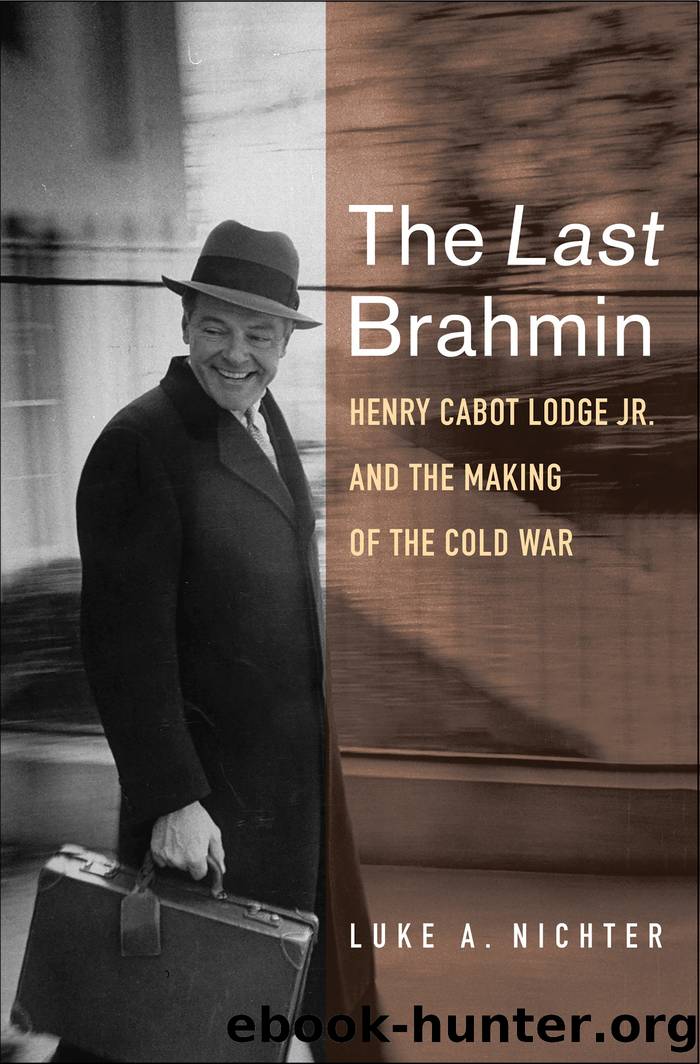The Last Brahmin: Henry Cabot Lodge Jr. and the Making of the Cold War by Luke A. Nichter

Author:Luke A. Nichter
Language: eng
Format: epub
Publisher: Yale University Press
Published: 2020-09-14T16:00:00+00:00
PART V
THE JOHNSON YEARS
14 • Lodge for President
In a December 8, 1963, story, New York Times Washington bureau reporter Felix Belair interviewed former President Dwight Eisenhower, who said he hoped Henry Cabot Lodge Jr. would leave his post in Vietnam and come back to run as the “common sense” candidate.1 The best chance for Republicans to beat Lyndon Johnson in 1964 was with a “moderate, common-sense candidate with an impressive background in international relations.” Eisenhower had spoken to Lodge about running for the nation’s top office. He believed that Lodge’s duty to remain in Vietnam had ended when John F. Kennedy was assassinated. Lodge was the only person who could compete with Johnson on the central issues of war and peace, and he was a “hard-hitting and persuasive speaker.”2
The New York Herald Tribune went even further than the Times, predicting that Lodge would run and defeat Johnson. The Christian Science Monitor predicted that Lodge would get the Republican nomination.3 “Maybe the Republicans have to lose in ’64. But I’d rather lose with Lodge than anybody else … at least he’ll fight the campaign on the right issues and he will know how to campaign in the big cities,” former Eisenhower aide John Reagan “Tex” McCrary said. “The only one who might win is Lodge, because he’s the only one with experience in areas of Kennedy failure.” 4
Journalist Roscoe Drummond mentioned that Lodge was being spoken of as a possible candidate in light of “the sensational turn of affairs in South Vietnam since he took over the embassy there some weeks ago,” combined with the fact that Republicans wanted “some alternatives to both [Barry] Goldwater and [Nelson] Rockefeller.”5 Richard Nixon had tried his best, losing in his bids for the presidency in 1960 and for the California governorship in 1962. The Belair New York Times story upset Nixon enough that two days later he went to see Eisenhower, who claimed he had been misquoted. “Now both of us agreed that we’d like to see him back here because he is a vivacious man, a leader type,” Nixon said, wondering how Lodge might affect the Republican chances in 1964.6 After saying he had been misquoted, Eisenhower wrote an apology to his friend Belair for implying he had been misquoted. “It isn’t true that I have asked Cabot to come home,” he wrote to a concerned Harold Stassen. “The most I have said in support of any candidate is that I would be delighted to see all Republican leaders discuss basic issues of the day and the objectives that the Republican Party should be setting for itself.”7
Eisenhower’s comments were worse for Lodge than if he had said nothing at all. Their appearance coincided with Lodge’s return to Washington for consultations. “I am receiving increasing pressure from various sources in connection with the forthcoming national campaign,” Lodge’s brother, John, wrote. “In the light of the splendid publicity which you have been receiving in the United States and the increased mention of you as a
Download
This site does not store any files on its server. We only index and link to content provided by other sites. Please contact the content providers to delete copyright contents if any and email us, we'll remove relevant links or contents immediately.
| Africa | Americas |
| Arctic & Antarctica | Asia |
| Australia & Oceania | Europe |
| Middle East | Russia |
| United States | World |
| Ancient Civilizations | Military |
| Historical Study & Educational Resources |
Magic and Divination in Early Islam by Emilie Savage-Smith;(1195)
Ambition and Desire: The Dangerous Life of Josephine Bonaparte by Kate Williams(1087)
Operation Vengeance: The Astonishing Aerial Ambush That Changed World War II by Dan Hampton(986)
What Really Happened: The Death of Hitler by Robert J. Hutchinson(868)
London in the Twentieth Century by Jerry White(847)
Time of the Magicians by Wolfram Eilenberger(843)
Twilight of the Gods by Ian W. Toll(812)
The Japanese by Christopher Harding(798)
Papillon by Henry Charrière(794)
Lenin: A Biography by Robert Service(779)
The Devil You Know by Charles M. Blow(778)
Twelve Caesars by Mary Beard(767)
Freemasons for Dummies by Hodapp Christopher;(747)
The Churchill Complex by Ian Buruma(730)
Napolean Hill Collection by Napoleon Hill(703)
The Enlightenment by Ritchie Robertson(691)
Henry III by David Carpenter;(689)
Bohemians, Bootleggers, Flappers, and Swells: The Best of Early Vanity Fair by Bohemians Bootleggers Flappers & Swells- The Best of Early Vanity Fair (epub)(685)
The Rise and Triumph of the Modern Self by Unknown(658)
